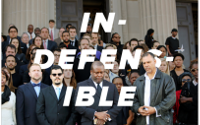Chief Defender Derwyn Bunton on recent criminal justice reports, suggested shifts in resource focus, protocol changes and the need for resource parity.
"The harvest is past, the summer is ended, and we are not saved." (Jeremiah 8:20 King James Bible).
Eight years after Katrina, the need for criminal justice reform in New Orleans remains acute. New Orleans' criminal justice leaders and stakeholders must work intelligently and creatively to ensure justice and fairness within our courts and on our streets. With major and expensive consent decrees looming over the New Orleans Police Department (NOPD) and the Orleans Parish Sheriff's Office (OPSO), our city cannot afford to waste time recycling the failed and expensive policies of the past. As a community, we must continue to push forward in the right direction with criminal justice reform.
I disagree with a recent Court Watch NOLA report insofar as it declared a "Culture of Continuances" at Orleans Parish Criminal District Court (CDC). CDC now has a larger proportion of serious and complex criminal cases. These cases take longer to investigate and prepare. A fact noted by the Metropolitan Crime Commission's 2012 Judicial Accountability Report. In this context, declaring a "Culture of Continuances" illustrated a lack of understanding of the system.
At the same time, court administration deserves scrutiny because the system can improve the fair and efficient movement of cases. Criminal justice leaders and stakeholders need to move forward, exploring better uses of technology, perhaps integrating court calendars and reaching out to other systems for ideas to promote fairness, justice and efficiency. Unnecessary delays do drive up costs. However, hasty court proceedings are even more costly and lead to shoddy work on all sides, creating more victims and less justice.
U.S. Attorney General Eric Holder's decision to reduce law enforcement resources on low-level, non-violent drug offenses, while seeking lower sentences in more cases, is recognition of the failure of mass incarceration. New Orleans should reach the same conclusion. New Orleans must deepen its commitment to evidence-based decision making. This is particularly important regarding charging and incarceration policies. The Orleans Public Defenders Office (OPD) spends tens of thousands of hours each year defending people better served by non-criminal treatment. Our system should narrow the use and applicability of habitual offender laws. 20 years in prison for a multiple possession marijuana offender is too long, period.
NOPD's emphasis on the use of summons, coupled with shifting resources to the most serious crimes, helps keep total arrests down without sacrificing public safety. Current criminal justice reforms are keeping the jail population in check, saving taxpayers millions. To achieve greater gains, we must not incarcerate people who do not warrant incarceration. Sheriff Gusman deserves some credit for having a policy of not detaining U.S. Immigration and Customs Enforcement (ICE) suspects. New Orleans achieves more safety and savings by expanding diversion eligibility, reducing habitual offender prosecutions and employing a greater continuum of services for pre-trial release. Alternatives to incarceration are far cheaper, and when done right, are just as safe.
One of the greatest challenges for the system and OPD is funding and resource parity. Louisiana is the only user-pay criminal justice system in the country. In a September 7, 2013 editorial, the New York Times wrote, "(Public Defenders) remain at a 'staggering disadvantage' because of the resources that go to law enforcement and prosecutors' offices." The editorial also noted federal intervention is looming on public defense. The New York Times, while illustrating the huge disparities in Louisiana's justice system, called our system of funding "perverse." The New York Times wrote, "Traffic fines and court fees paid by defendants who are convicted or plead guilty account for nearly half of the annual budget of (OPD). This is an unpredictable revenue stream..." The editorial also noted, "New Orleans residents pay $367 per capita for the police and less than $2 per capita for public defense." Justice is only ensured when parity exists. Reform will fail unless all entities have the necessary resources to work effectively toward a just, fair and efficient criminal justice system. We have a chance to create a criminal justice system that works for all. Summer may be ending, but we are not yet saved.




